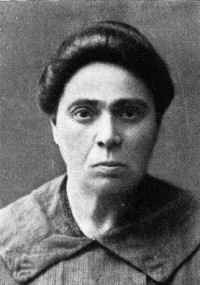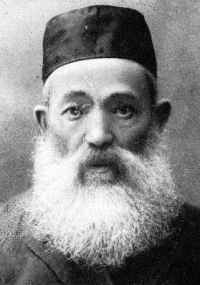 |
 |
|
|
[Page 195]
52°58' 28°03'
by Khen
Translated by Yocheved Klausner
In 1906, a Jewish settlement appeared inside a thick forest, full of fresh air and pleasant, soul refreshing winds. In a hidden corner, enveloped in grass and trees, the princess Gogin-Logy decided to live, in a beautiful house on a large hill. Not often did she come to visit the place to have a rest in the midst of Nature. The estate was managed by her agent and his workers, who lived near the house.
Suddenly, everything changed. The forest was sold to the “Fritz-Schulz” Company in Leipzig, which established a saw-mill and a laminated-wood factory. The railroad from Stari-Dorogi was extended to Verkhotin.
The whistles of the locomotive and the factories introduced new life in town. Houses were built for the workers who came to live in town, working in two shifts. The tall trees were cut and taken to the saw-mill. New faces were seen in town, which became full of people, among them agents and buyers of wood for heating and wood panels. A fence was built around a large area, and it served as a storehouse. There was also a small factory of coal and tar, owned by R'Zelig Khinitz and David Dobrovorski.
|
|
|||
| Hinda Rachel Khinitz | R'Azriel Zelig Khinitz |
Jewish merchants arrived from Minsk, Vilna, Warsaw and even from Koenigsberg and Berlin. Tens of Jewish families built beautiful houses and settled in town; they were merchants, laborers, office employees, hotel owners.
A small community was established, with two minyanim, one of Hasidim, the other Mitnagdim. A Modern Heder existed in the Community, where the language of instruction was Hebrew. A small group of “intelligentsia” was formed. During the summer, many tourists visited the place, enjoying the shade of the trees, the pine groves and the dry climate. The days were sunny, and at night the streets were lit by electric lights, thanks to the saw-mill, which worked day and night and provided cheap electricity to all houses.
Through the local post office, almost every family received newspapers in Russian, Hebrew and Yiddish. Parents sent their children to study at the “Lida” and “Etz-Chayim” [Tree of Life] Yeshivas in Slutsk. With the change of regime in the country, the Jewish leadership changed as well, as did Jewish life in the Community. In 1942, they were all sentenced to destruction and annihilation.
[Page 196]
Where are you, dear Jews, who served as an example in your education, with your good faces and merciful hearts? I remember many, many of you.
R'Azriel Zelig Khinitz, former ritual slaughterer, a scholar among the students of the Volozhin Yeshiva – refined, educated, Zionist and lover of the Hebrew language. His house was a meeting place for scholars – a place of both Torah and enlightenment.
R'Levi-Yitzhak Halperin, who always set aside time for the study of Torah, a good cantor and a pleasant conversation man.
Mordechai the butcher, a friendly person, loved by all.
R'David Katzenelson, a Hebrew “enlightened” [maskil], a man of culture and a Zionist.
The brothers Fisch, working as office employees, intelligent, full of the spirit of enlightenment.
Goldman, a plump Jew, a strong forest-man and a good worker. His daughters were famous – they were very intelligent and had a good education.
R'Noah Weinstein, a Torah scholar. He was an accountant; this was his livelihood and Torah was his pride.
The brothers Dobrovorski. The elder became rich and famous and made a fortune, the younger, David, was a good Jew, of simple ways and a big good heart.
Leiba the tailor – everybody knew him. He had a big beard and many children. He would say: “Blessed be the Lord, day by day. He bears our burden” (Psalms 68:20) – and indeed Leiba was burdened with children, but also with many wise sayings. He was guided by faith and confidence. On Shabat and Holidays his children would follow him to the synagogue, and would say: “we are a full minyan!”
Eliyahu Bodenitz, baker and innkeeper. He had beautiful daughters and his house, which was situated near the train-station and the post-office, was always full of joy and singing; it was the stopping place of many passers-by.
The brothers Binyamin and Efraim Vinnik, sons of R'Pinye “Rossayer,” – faithful and honest Jews, one was a grocer and the other a broker.
R'Binyamin Shinderman, came from Vholyn, an honest and righteous Jew, owned a grocery store. His family charmed the residents, with their simplicity and honesty.
The Radonski family, pleasant and honest.
The Glinik family, the father a Hebrew teacher in the United States, a true scholar. His house was a place of Torah and learning.
Where are you, the holy and pure?? A cruel and wicked hand has put an end to your lives.
May these lines be a memorial for you, and the others that I did not mention by name. May their memory shine for generations and generations.
|
|
JewishGen, Inc. makes no representations regarding the accuracy of
the translation. The reader may wish to refer to the original material
for verification.
JewishGen is not responsible for inaccuracies or omissions in the original work and cannot rewrite or edit the text to correct inaccuracies and/or omissions.
Our mission is to produce a translation of the original work and we cannot verify the accuracy of statements or alter facts cited.
 Slutsk, Belarus
Slutsk, Belarus
 Yizkor Book Project
Yizkor Book Project
 JewishGen Home Page
JewishGen Home Page
Copyright © 1999-2026 by JewishGen, Inc.
Updated 5 Nov 2022 by LA